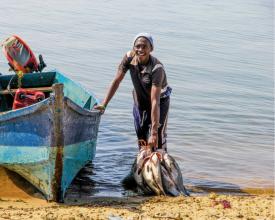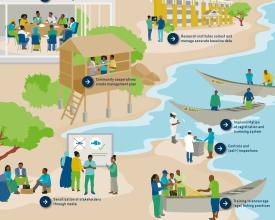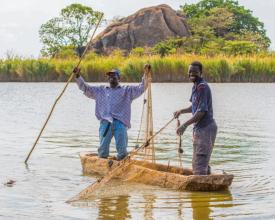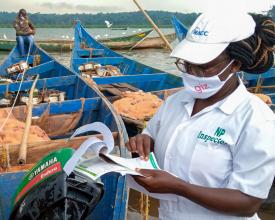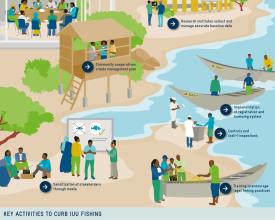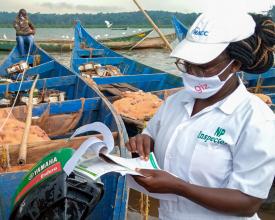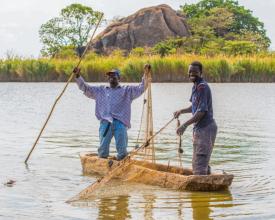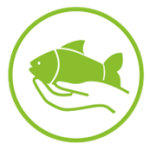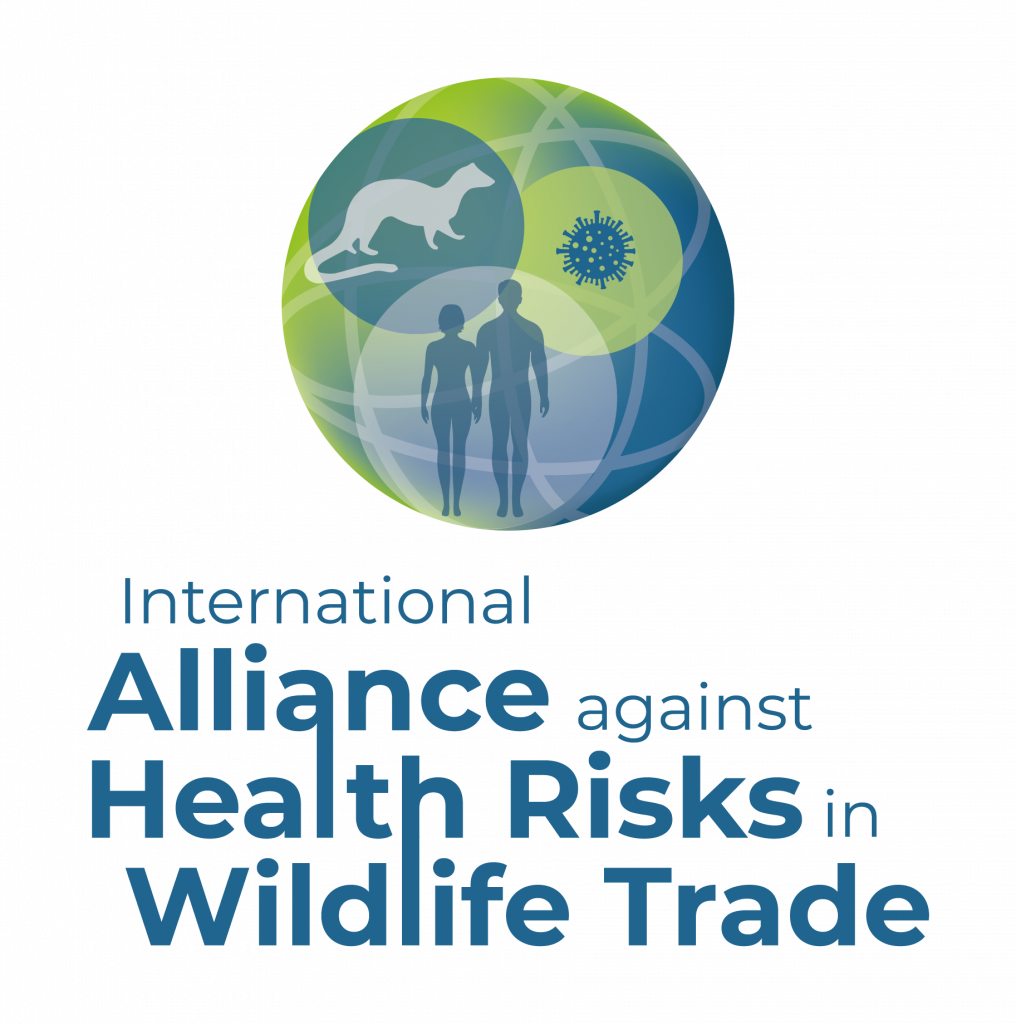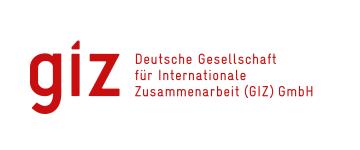
Combating illegal, unreported, and unregulated fishing practices

The Global Programme “Sustainable Fisheries and Aquaculture”, implemented by GIZ, aims to increase fish supply from sustainable and resource-friendly fisheries and aquaculture to boost a healthy and diverse nutrition. The solution presented here supports sustainable fishing practices in artisanal fishing communities and preserves aquatic resources. It combats illegal, unreported, and unregulated (IUU) fishing by establishing multi-stakeholder platforms (MSPs) to develop a legal framework for sustainable fisheries management. The project also provides training to fishers on legal fishing practices, implements a robust registration and licensing system, and builds cooperative community-based management structures. It improves patrol quality and conducts public campaigns to raise awareness about sustainable fishing practices and the dangers of IUU fishing. These efforts help restoring fish populations, stabilize the fishing sector's profitability, and improve the livelihoods and safety of fishing communities.
Context
Challenges addressed
The global issue of illegal, unreported, and unregulated (IUU) fishing affects both marine and freshwater ecosystems. It includes illegal activities like fishing without a license or using prohibited gear, unreported catches that bypass official records and unregulated fishing by crossing the maximum sustainable yield or neglecting fishing seasons. IUU is a major driver of overfishing, harming the sustainable fisheries sector and globally leading to significant economic losses, mainly caused by industrial fleets. It is also often linked to associated crimes to reduce costs and maximize profits, ranging from the lack of safety regulations to the use of forced labour. But little is known about the impact of artisanal fisheries to fish stocks, which often remain unmanaged due to the absence of authorities or resources for data collection, reporting and surveillance. The same goes for small-scale fishers, who may struggle to comply with legal requirements such as using approved fishing gear, due to its unavailability and price.
Location
Process
Summary of the process
This solutions foundation for addressing IUU practices in artisanal fishing is the establishment of multi-stakeholder platforms (MSP) to bring together different actors to develop a legal framework for sustainable fisheries management. The collection and management of accurate baseline data on fish stocks and catches are followed by trainings to encourage legal fishing practices and explain the benefits of fisheries management while emphasizing the importance of the use of appropriate fishing gear. For transparency reasons a robust registration and licensing system is needed, including mobile and community-led, on-site licensing initiatives. For better success, building cooperatives and community-based management structures have proven helpful. A key principle for curbing IUU are controls and inspections, improved in patrol quality through specialized training for inspectors and encouraging processors to conduct self-inspections. Additionally, sensitization of stakeholders and the public is an important activity in combatting IUU while fostering compliance and accountability. This can be reinforced by integrating local knowledge and establishing clear and enforceable regulations as well as raising awareness of the consequences of (non-) compliance.
Building Blocks
Relevance
The global issue of illegal, unreported, and unregulated (IUU) fishing affects both marine and freshwater ecosystems. IUU fishing includes illegal activities like fishing without a license or using prohibited gear, unreported catches that bypass official records and unregulated fishing without management strategies like fishing beyond the maximum sustainable yield or neglecting fishing seasons. As a major driver of overfishing, IUU activities jeopardise the economic backbone of the sustainable fisheries sector. Globally, IUU fishing practices lead to significant economic losses, estimated at USD 23.5 billion annually, mainly caused by industrial fleets. However, little is known about the impact of artisanal fisheries to fish stocks in coastal areas or inland waterbodies, which often remain unmanaged due to the absence of authorities or resources for data collection, reporting and surveillance. The same goes for small-scale fishers, who may struggle to comply with legal requirements such as using approved fishing gear, due to its unavailability and price. IUU fishing operations are furthermore often linked to other associated crimes, like the lack of safety regulations, fair working conditions and even the use of forced labour, to reduce costs and maximize profits.
Due to the relevance of combating IUU fishing, the FAO published many documents, including the Code of Conduct for Responsible Fisheries, the International Plan of Action to Prevent, Deter and Eliminate IUU Fishing and Voluntary Guidelines for Securing Sustainable Small-Scale Fisheries. Our approach follows these guidelines in promoting human rights and fair access to resources. By addressing IUU fishing, we also contribute to the Sustainable Development Goals (SDGs) 1 and 2 (no poverty, no hunger) and SDG 14 (life below water). Other global efforts, such as the Conference of the Parties (COPs), Global Alliance for Food Security and the Blue Food Alliance, emphasize the urgent need for integrated and standardized operations. With this knowledge product, we wish to help others to support sustainable fishing practices in artisanal fishing communities and preserve aquatic resources for generations to come.
Planning and first steps
Establishment of multi-stakeholder platforms (MSP)
Addressing IUU practices in artisanal fishing requires a coordinated approach between different stakeholders involved in the fishing sector and includes a variety of strategies and actions. The foundation of this approach is the establishment of multi-stakeholder platforms (MSP) that bring together government institutions, the private sector and civil society to collaborate and develop a legal framework for sustainable fisheries management. This also includes fisherfolk and community members, particularly women. Regarding marine fisheries, the importance of trans-regional dialogue and agreements must be taken into account, due to the interconnected nature of the marine environment. MSPs encourage an integrated approach to governance, as they ensure all kinds of perspectives are considered and that the management strategies are effective and beneficial to all involved. Regular meetings of the MSPs reinforce the exchange among the various actors.
Baseline data
The next step is the collection and management of accurate baseline data, which is crucial for understanding the extent of the issue and for monitoring progress. As local research institutes may already assess data on catch and stock estimations, their role is vital for sustainable management of fish resources. However, they are often underequipped, understaffed and need initial capacity building and investments. Supporting these institutions with technical equipment and methodological training will also provide better and more transparent catch assessments during and after the project implementations. During this first phase, recognizing traditional knowledge is crucial for understanding the history of local fisheries.
Training to encourage legal fishing practices
Measuring the initial state of fish stocks and regulations will likely highlight imbalances between fish availability and the licensing landscape. Low proportions of legally operating fishers emphasize the need for training to encourage legal fishing practices. The training content includes information on harmful fishing practices, such as the use of fine-meshed mosquito nets or poison. Additionally, the benefits of fisheries management are explained, which promotes the long-term stabilization of fish populations through sustainable fishing methods. To address the causes of IUU fishing, the training should consider the viewpoints and perspectives of fishers, as IUU practices in artisanal fishing often result from a lack of access to appropriate gear: what is needed to resort to legal fishing? This might include adapted regulations or the availability of appropriate fishing gear.
Community-based management structures and sensitization of stakeholders
In tandem with the technical measures, building cooperative and community-based management structures has proven to be very successful. Such communities establish rules and regulations for accepted fishing methods but also facilitate stakeholder engagement to encourage local fisherfolk and associations to participate actively in fisheries management. Training programmes for the management structures focusing on organizational and technical capabilities are essential, equipping beneficiaries with the necessary skills to sustainably manage their waterbodies. In certain regions, the approach has included restructuring local management systems into cooperatives. This ensures that they have legal status and a well-defined management plan, thereby validating their operations. It also improves their ability to manage resources and increases their access to financial support through various funding opportunities.
Sensitization of stakeholders and the general public is another major activity in the context of combating IUU fishing. Information campaigns, such as videos explaining data collection at landings and the role of inspectors, contribute to raising awareness about the importance of sustainable fishing practices and the dangers of IUU fishing. These campaigns can be spread through national television, social media platforms or radio programmes to reach a wide audience and foster compliance and accountability. Public engagement initiatives, like consultation workshops, are essential for disseminating information on licensing, legislation, and the consequences of non-compliance. Especially focus group discussions further strengthen a sense of responsibility among fishers. Key factors for success include integrating local knowledge, establishing clear and enforceable regulations, and raising awareness of the consequences of compliance (sustainable fish stocks) and non-compliance (penalties).
Potential risks such as resistance to change, insufficient funding, and the complexity of monitoring vast and remote fishing areas need to be continually addressed through adaptive management and stakeholder collaboration.
Registration and licensing, controls, and inspection
As a key measure to raise transparency within small-scale and artisanal fisheries, a robust registration and licensing system needs to be put in place. It is advised to introduce mobile, and if possible, community-led, on-site licensing initiatives, providing immediate support for licensing with registered tax numbers. This enhances the accessibility of the licensing process and compliance among fishers, due to a sense of community ownership. In cooperation with a dedicated governmental body, such as the Department of Fisheries and the local research institute, a digital management system should be developed. This central database helps to monitor licenses and registrations from multiple locations and thus enables conclusions to be drawn about the status of fish populations.
Controls and inspections are key principles of curbing IUU fishing. Improving the quality of patrols through specialized training for inspectors is essential to monitor fishing activities directly on board or after landing. Additionally, processors are encouraged to conduct self-inspections to prevent the processing of undersized fish and enforcing regulations in their businesses, thereby reducing reputational risks in the industry. The development and / or revision of standard operating procedures for these controls ensures that they remain relevant and effective in the face of changing IUU fishing practices.
Case Study
In Eastern Province, Zambia, a significant transformation of fishing practices in small waterbodies was achieved under the Fish for Food Security (F4F) project. This change involved reducing the use of illegal fishing gear among local fishers, aligning their activities with the FAO’s Guidelines for Sustainable Small-Scale Fisheries.
Initially, the management of these fishing practices faced challenges, including a lack of baseline data on fish stocks and the use of harmful small-meshed nets (mosquito nets) or poison. To address these challenges, the F4F project adopted a multi-stakeholder approach, partnering with entities like the Aquatic Ecosystems Services Consultancy for fish stock assessments. Likewise, they worked on restructuring the Dam Management Committees (DMCs) in collaboration with the World-Wide Fund for Nature (WWF) and Zambia Governance Foundation (ZGF), ensuring the inclusion of fisherfolk representatives.
The F4F further developed a training manual on sustain-able fisheries management of small waterbodies and rolled out the trainings to the DMCs, fisherfolk and traditional leaders with support from the Department of Fisheries (DoF). Among others the topics varied from ‘Leadership’ and ‘Financial Management’ up to ‘Fishing Practices’, which attracted a lot of discussions especially from fishers.
Later, the community and DoF set up regulations on restricting the use of illegal fishing gear and encouraged the use of wide-meshed cotton nets. The involvement of the fisherfolk has helped curb illegal and unregulated fishing, as they understand the adverse effects on the fish stocks, the environment, and the sustainability of their business.
Impacts
Ecologically, it primarily benefits the restoration of fish populations, as legal fishing gear allows young fish to survive and reproduce. Implementing sustainable practices helps maintain biodiversity and the health of marine and freshwater environments for future generations. Transparent catch assessments enhance research quality, ensuring accurate reflections of fish stocks and contributing to effective management decisions.
Economically, sustainable practices stabilize and potentially enhance the profitability of the fishing sector. For small-scale and artisanal fishers, this means reliable and abundant catches, leading to improved financial security. Aligning the fishing sector with market standards opens paths for business development.
Socially, livelihoods and the responsibility of fishing communities are uplifted, including safety in fishing activities and valuing the health of fishery workers. Aligning fishing activities with legal frameworks ensures stability and security for fisherfolk, processors, and vendors. Abiding by legal practices reduces IUU-associated crimes like bribery and corruption.
Establishing robust, clear, and enforceable fishing laws and regulations, coupled with enhanced transparency, ensures monitored and effectively regulated fishing activities. Improved transparency helps combat IUU fishing, builds trust among stakeholders, and aligns the industry with international standards.
Beneficiaries
Benefitting small-scale fishers and marine and freshwater environments by improving livelihoods, financial security through sustainable practices, supporting local research and engaging communities to address waste management and promote sustainable fishing.

